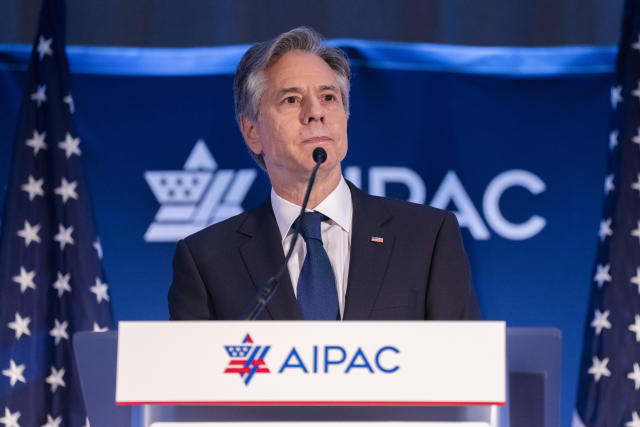US Secretary of State Antony Blinken arrives in Saudi Arabia to meet Crown Prince Mohammed

Views (83)

U.S. Secretary of State Antony Blinken arrived Tuesday in Saudi Arabia on a trip in which he plans to meet Crown Prince Mohammed bin Salman amid strained relations between Riyadh and Washington. Blinken's trip, his second to Saudi Arabia since becoming America's top diplomat, comes after the kingdom under Prince Mohammed has been more willing to disregard the U.S. in striking its own decisions.
DUBAI, United Arab Emirates (AP) — U.S. Secretary of State Antony Blinken arrived Tuesday in Saudi Arabia on a trip in which he plans to meet Crown Prince Mohammed bin Salman amid strained relations between Riyadh and Washington.
“Under the hood, especially when it comes to security and a few other matters like that, the relationship is stronger than it was a year ago,” said Hussein Ibish, a senior resident scholar at the Arab Gulf States Institute in Washington. “It looks more strained — and in some superficial ways it is — but it is overall stronger.”
With oil prices well below $100 a barrel, the Biden administration doesn’t have an immediate concern over prices at the pump in the summer driving season. Washington likely does hope to leverage its security relationship with Saudi Arabia as it gets warmer with China and Russia. However, the Saudis likely want guarantees that Biden can't provide when it comes to Congress stopping arms sales to the kingdom, Ibish said.
“Khashoggi still haunts the halls of Congress. I don’t think that’s over in Washington,” Ibish said. “The rest of the world has moved on but I don’t think that Congress has moved on.”
Asked about Blinken bringing up human rights issues, including Khashoggi's death, Deputy Assistant Secretary for Arabian Peninsula Affairs Daniel Benaim told journalists last week that “human rights are a pillar of how this administration engages with countries around the world and in this region.” Benaim declined to discuss specifics.
“I think what you’ll see on this trip is a vision of the U.S.-Saudi relationship that’s both rooted in our historic mainstays of cooperation in areas like defense and security and counterterrorism, includes ongoing important regional diplomacy when it comes to Yemen and Sudan, and looks for opportunities for regional de-escalation and regional integration,” Benaim said.
He added: “We will not leave a vacuum for our strategic competitors in the region.”
Outside of meeting Prince Mohammed and other Saudi officials, Blinken also will attend a meeting of an anti-Islamic State summit in Riyadh, as well as attend a meeting of foreign ministers from the Gulf Cooperation Council. The six-nation GCC includes Bahrain, Kuwait, Oman, Qatar, Saudi Arabia and the United Arab Emirates.
“A deeper diplomatic engagement by the United States is likely to produce better outcomes in the long run than simply washing our hands and pulling back from the region,” wrote Brian Katulis, the vice president of policy for the Washington-based Middle East Institute.
However, the challenges are many.
The Yemen war continues despite prisoner swaps and efforts to end the conflict. Meanwhile, both sides likely have wants that won't be fulfilled. Saudi Arabia increasingly has pushed for a nuclear cooperation that includes America allowing it to enrich uranium in the kingdom — something that worries nonproliferation experts as spinning centrifuges opens the door to a possible weapons program. Prince Mohammed has said the kingdom would pursue a nuclear weapon if Iran had one.
Blinken on Monday night told a meeting of the American Israel Public Affairs Committee that the Biden administration continues to believe “that diplomacy is the best way to verifiably, effectively, and sustainably prevent Iran from getting a nuclear weapon.” However, he added: “All options are on the table to ensure that Iran does not obtain a nuclear weapon.”
Blinken first traveled to Saudi Arabia as America's top diplomat last year as part of Biden’s trip there. That trip saw Biden fly directly from Israel to the kingdom. Just before it, Saudi Arabia allowed overflight rights to Israeli airlines heading to Asia — a major move allowing them to save both flying time and jet fuel.
___
Follow Jon Gambrell on Twitter at www.twitter.com/jongambrellAP.
0 Likes
